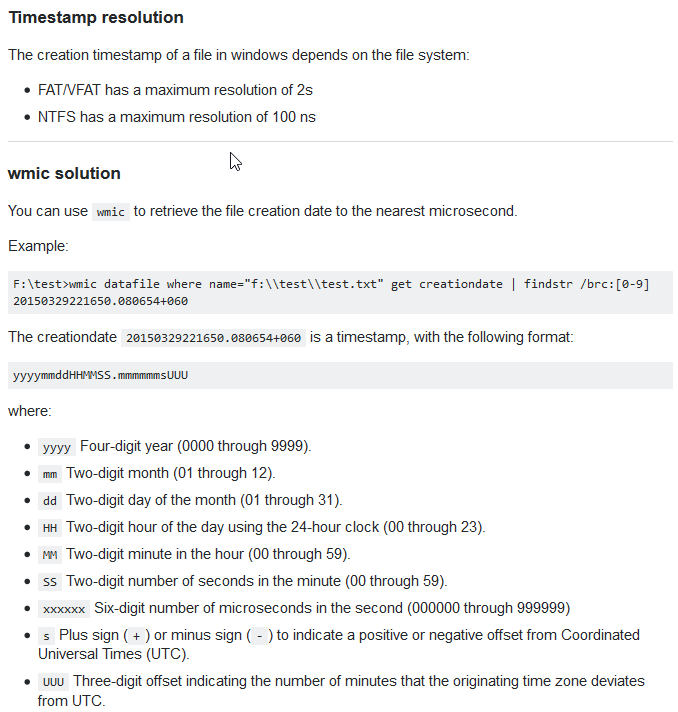Search the Community
Showing results for tags 'MS'.
-
Hello, Propably not an absolute clean approach, (not checking/caring about little / big endian), but it's doing, what I need: Return the last modified time stamp including the milliseconds: #include <Date.au3> $file = "c:\temp\test.txt" ; file must already exist $TSLastModMs = GetFileLastModWithMs($file) ConsoleWrite('@@ Debug(' & @ScriptLineNumber & ') : $TSLastModMs = ' & $TSLastModMs & @CRLF & '>Error code: ' & @error & @CRLF) ;### Debug Console Func GetFileLastModWithMs($_FullFilePathName) local $h = _WinAPI_CreateFile($_FullFilePathName, 2, 2) local $aTS = _Date_Time_GetFileTime($h) _WinAPI_CloseHandle($h) local $aDate = _Date_Time_FileTimeToArray($aTS[2]) ; [2] = LastModified Return StringFormat("%04d-%02d-%02d %02d:%02d:%02d.%03d", $aDate[2], $aDate[0], $aDate[1], $aDate[3], $aDate[4], $aDate[5], $aDate[6]) EndFunc ;==>GetFileLastModWithMs >Running AU3Check (3.3.14.5) from:C:\Program Files (x86)\AutoIt3 input:C:\temp\filetime.au3 +>12:10:00 AU3Check ended.rc:0 >Running:(3.3.14.5):C:\Program Files (x86)\AutoIt3\autoit3.exe "C:\temp\filetime.au3" --> Press Ctrl+Alt+Break to Restart or Ctrl+Break to Stop @@ Debug(8) : $TSLastModMs = 2018-09-07 10:09:54.073 >Error code: 0 +>12:10:00 AutoIt3.exe ended.rc:0 +>12:10:00 AutoIt3Wrapper Finished. >Exit code: 0 Time: 0.9068 Regards, Rudi. --- original posting - what was my problem, below --- doing some search I found postings, stating that 2s will be the smallest time resolution for filegettime(). 2s seem to be fact for FAT as FS, NTFS has a much finer granularity. This posting states, that NTFS has a granularity of 100ns: https://superuser.com/questions/937380/get-creation-time-of-file-in-milliseconds is it possible to get more than just the "second" information? The reason, why I need this is, that I need to sort files by their creation sequence, and it can happen, that two files are created within the same second, so I cannot resolve their creation order without "millsecond info". Regards, Rudi. edit: I just tried PowerShell, there it's possible to retrieve even more than millisecond information: Millisecond : 336 Ticks : 636719150403363219 TimeOfDay : 11:04:00.3363219 PS C:\Users\Rudi> echo test > test.txt PS C:\Users\Rudi> $(Get-ChildItem .\test.txt).creationtime | format-list Date : 07.09.2018 00:00:00 Day : 7 DayOfWeek : Friday DayOfYear : 250 Hour : 11 Kind : Local Millisecond : 336 Minute : 4 Month : 9 Second : 0 Ticks : 636719150403363219 TimeOfDay : 11:04:00.3363219 Year : 2018 DateTime : Freitag, 7. September 2018 11:04:00 regards, Rudi.
- 3 replies
-
- filegettime()
- ms
-
(and 2 more)
Tagged with:
-
How can I get a list of all the headings in a Microsoft Word document by using AutoIt? I tried: #include <Word.au3> #include <MsgBoxConstants.au3> Global Const $wdRefTypeHeading = 1 ; Heading $Headings = $oDoc.GetCrossReferenceItems($wdRefTypeHeading) $Count = UBound($Headings) MsgBox($MB_SYSTEMMODAL, "Debug", $Count) But it did not function well.. For example, it just get 1 heading from my rich document that have many headings! I also tried this: #include <Word.au3> #include <MsgBoxConstants.au3> $Count = $oDoc.Paragraphs.Count For $i = 0 To $Count - 1 $oRange = _Word_DocRangeSet($oDoc, -1, $wdParagraph, $i, $wdParagraph, 1) If StringInStr($oRange.text, "Header Text") Then MsgBox($MB_SYSTEMMODAL, "Debug", $oRange.Style) EndIf Next And this: #include <Word.au3> #include <MsgBoxConstants.au3> $Count = $oDoc.Paragraphs.Count For $i = 0 To $Count - 1 $oRange = _Word_DocRangeSet($oDoc, -1, $wdSentence, $i, $wdSentence, 1) If StringInStr($oRange.text, "Header Text") Then MsgBox($MB_SYSTEMMODAL, "Debug", $oRange.Style) EndIf Next But the Range.Style property didn't work in AutoIt.. Could someone help me how to get a list of all the headings in a Word document?
-
I tried a lot of techniques but still have no luck.. How can I delete the second sentence until the last sentence of a set paragraph range on a Microsoft Word document? #include <Word.au3> Global $oWord, $oDoc $oWord = _Word_Create() $oDoc = _Word_DocGet($oWord, 1) Global Const $Count = $oDoc.Paragraphs.Count For $i = 0 To $Count - 1 $oRange = _Word_DocRangeSet($oDoc, -1, $wdParagraph, $i, $wdParagraph, 1) ; Here will be placed the missing code Next Sample of the beginning of a Word document: This is a sentence 1. This is a sentence 2. This is a sentence 3. This is a sentence 4. This is a sentence 5. This is a sentence 6. This is a sentence 7. This is a sentence 8. This is a sentence 9. Sample of the final result: This is a sentence 1. This is a sentence 4. This is a sentence 7.
-
How can I programatically find the styles of all the sentences on a Microsoft Word document? I tried this code but it didn't work: #include <Word.au3> Global $oWord, $oDoc $oWord = _Word_Create() $oDoc = _Word_DocGet($oWord, 1) Local $sCount = $oDoc.Sentences.Count For $i = 0 To $sCount - 1 Local $oRange = _Word_DocRangeSet($oDoc, -1, $wdSentence, $i, $wdSentence, 1) ConsoleWrite("The style of this sentence is: " & $oRange.Style & @LF) Next



